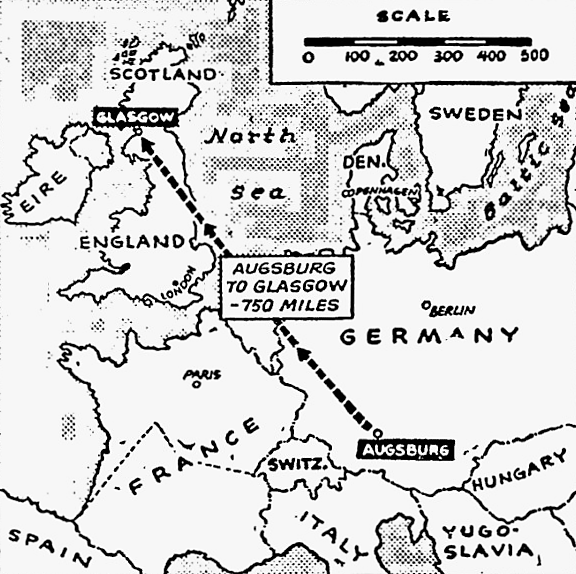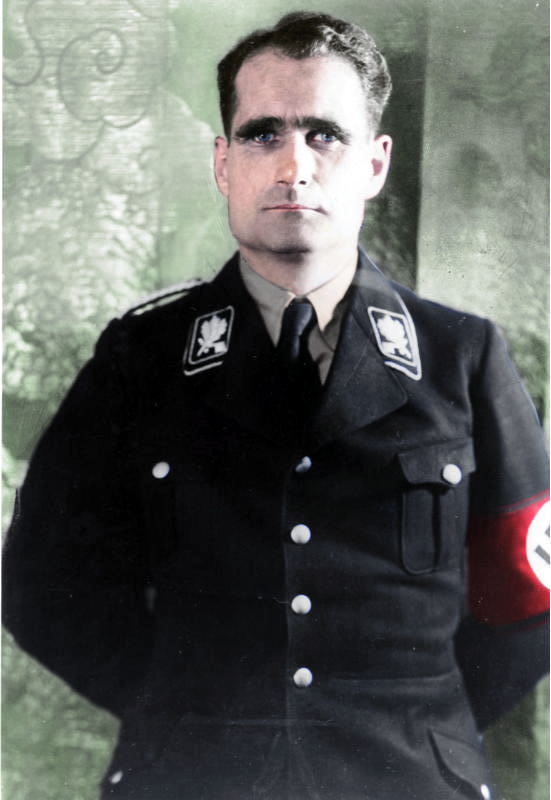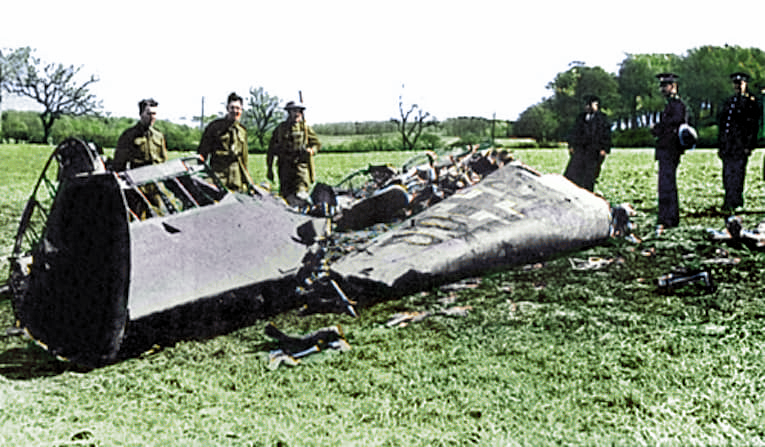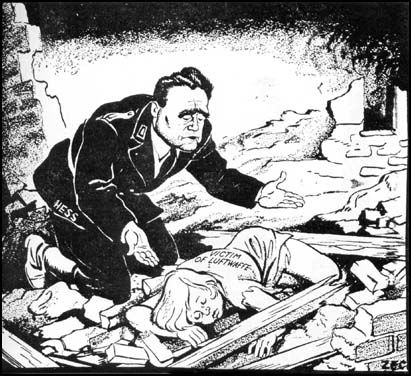The Pittsburgh Press (May 13, 1941)
HESS CHEERFUL, BUSY WRITING
…
English say fugitive didn’t bring peace plan
…
By Edward W. Beattie Jr., United Press staff writer

The path of Hess’ flight.
London, May 13 –
Rudolf Hess dropped by parachute on a Scottish farm with the words “I have come to save humanity,” British quarters reported today in advancing the sensational theory that the No. 3 Nazi split with Adolf Hitler because he believed the Führer is leading Germany toward full partnership with Communist Russia.
British quarters reported that Hess’ intense hatred of the Communist regime and his belief that Hitler had embarked the Third Reich along a path of increasing collaboration with Russia might well prove to have motivated the Nazi leader’s strange flight to Britain.
Hess, responsible British sources said, appears “to have got religion.”
He is in bed in a hospital, well and cheerful, except for a slight pain in his injured ankle, in which a small bone is broken, and is writing a great deal, reliable British sources reported.
Prime Minister Winston Churchill, who appears to have taken personal charge of the affair, went to Buckingham Palace for an audience with King George VI which was believed to concern Hess.
On the basis of information available to British sources, it was said that Hess appeared to be affected with an almost religious fervor. These quarters said that, in his first interviews with British officials after he landed 10 miles from Glasgow Saturday night, he talked in general terms which indicated that the question of German collaboration with Russia might be the chief motive behind his weird behavior.
There have been indications in dispatches from Europe for some days that Germany and Russia may be moving at this time into a phase of closer cooperation. Rumors have circulated that Hitler and Joseph Stalin might confer shortly.
It was said that Hess showed clearly he had been under intense nervous strain for many months, a nervous strain that might derive from his belief thar Hitler’s policy was violating the fundamental Nazi tenet of opposition to Communism.
Reports spread through London that Hess was ready to disclose to the government the secrets of Germany’s war plans and internal situation. These reports were unconfirmed; officials were close-lipped.
It was disclosed authoritatively that Hess had been removed from a Glasgow hospital, where he was treated for a broken ankle, to a secret place. It was understood that he would be given the formal status of prisoner of war.
Hess did not bring peace proposals with him on behalf of dissident Nazis but fled Germany for his own safety, it was said authoritatively.
It was known only to high officials whether Hess was revealing the secrets of Germany’s war plans and internal condition.
He believes he was misguided and talks like a man with a guilty conscience. If the flight shows anything, it shows that the core of Germany is rotten.
Flight of escape
It was emphasized that Hess’ whereabouts would be kept secret and nobody outside government officials would be permitted to see him or communicate with him.
An authoritative informant said:
Hess has definitely not brought peace proposals. His flight was an escape.
Hess came in defiance of authority. I suppose he came to Great Britain because he knew that if he had got to a neutral country he would have been in imminent peril of being killed.
Presumably, Hess did it as the result of disagreements with other prominent Nazis, possibly it was a natural revulsion at further unbearable association with others of the Nazi gang.
It was said that Ivone Kirkpatrick, foreign office expert sent to Glasgow to question Hess, had made only a preliminary report. Informants disclosed that physicians had examined Hess thoroughly and were ready to certify him wholly sane.
Information of value
Hess was believed to be in some quiet spot, probably in the country, where the tranquility of his surroundings in an English spring might put him in a mood to talk fully. There had been no intimation as to just how communicative he was, because no detailed report had been received.
There were strong intimations that Hess had talked a good deal, even if in generalities, and his information would be of the greatest value to the government.
It was emphasized there would be no attempt to force Hess to talk and that he would be treated as an honorable prisoner of war.
Reliable informants in official quarters said Hess seemed like a man imbued with the zeal of a convert against the present trend of Nazi policy and that he was eager to unpack his knowledge. They dismissed suggestions his flight might have been a Nazi trick so that he could give false information.
Called natural choice
There were indications that, while official statements might be issued soon on Hess, they would leave out any information which he might disclose of the many Nazi secrets he had been entrusted with.
Informants said it was natural that Hess chose Scotland for a landing place.
There, they said, he would avoid any involvement in night airplane operations. He might have known that London was being raided heavily Saturday night when he landed, they added. Also, informants said, there was every indication that Hess came alone in the three-man Messerschmitt fighter plane. He had done little piloting in recent years, they said, and so might have crossed Scotland in trying to find a level landing place.
Rift believed cause
The amazing parachute landing in Scotland of Hess, the incorruptible, Hitler’s shadow for more than 18 years, was generally held to mean that there was a rift, grave and possibly wide, in the Nazi leadership.
It was believed that Prime Minister Winston Churchill might soon clear up the mystery to some extent in a statement.
Fully alert to the almost inestimable value of the flight of the second heir to Hitler’s dictatorship, the Ministry of Information began broadcasting the details early this morning, through the officially controlled BBC, in German and Italian. The broadcasts continued periodically throughout the day.
Britons, hardly able even yet to grasp in all its implications of the amazing fact that Hitler’s Deputy Führer, whom Hitler trusted above all other high Nazi leaders, waited excitedly for the first hint whether Hess had talked, and what he had said.
Politically important
That it was a political development of the greatest importance, and the greatest blow Nazism had suffered since the outbreak of the war, there seemed no doubt.
The Nazis’ broad hints that Hess was mentally deranged were accepted as confirmation.
The fact was, according to all evidence, that Hess escaped from Germany as had so many refugees. He had flown direct from the Messerschmitt plane factory at Augsburg, near Munich in southern Germany, to Glasgow in a Messerschmitt 110 fighting plane. He took no ammunition with him and he parachuted when his gasoline ran out.
There had been reports he might have brought here a peace proposal representing not only himself but other Nazi leaders who had split from Hitler and whose delegate he had been in his flight to Scotland.
Lands near Duke’s estate
It was reported that Hess had sought to land near Strathaven, on the estate of the athlete-aviator the Duke of Hamilton and Brandon, and that soon after he landed, he asked to be taken to the Duke.
This was an angle of the story still to be cleared. The Duke has been an active flying officer during the war. Called the “Boxing Peter,” he was long prominent in British athletics. He lead the party which flew over Mount Everest. There was no indication here that the Duke had been interested especially in international politics or had known Hess.
The government had withheld all information of Hess’ landing for two days. It was not until the German radio had disclosed last night that Hess was missing that the government made it known that Hess had parachuted to safety in Scotland and was a prisoner of war in a Glasgow hospital.
Hess is questioned
It was assumed that Mr. Churchill was personally handling the situation and that it was in his instructions that the Foreign Office had sent Ivone Kirkpatrick, director of the foreign division of the Ministry of Information, to Glasgow to take charge of the questioning of Hess.
Mr. Kirkpatrick, a key man in the foreign service, was first secretary of the British Embassy at Berlin from 1933, when the Nazis took office, until 1938. He knows Hess well, as he knows Hitler and other Nazi leaders, and he was special interpreter for the late Neville Chamberlain at the Godesberg and Munich conferences with Hitler which preceded – and, some say, led up to – the war.
Hess was not only the No. 3 man, second heir to the dictatorship, but he was the man among the high Nazi leaders most trusted by Hitler.
Jail with Hitler
He had served a term in the Landsberg Fortress with Hitler, after the Munich Beer Hall Putsch of 1923, and it was there that he helped Hitler write the Nazi bible, Mein Kampf, and became his private secretary. Some say Hess did most of the writing. He was made Deputy Führer after the 1934 purge. To Hess alone, among high Nazis, Hitler used the intimate German “du” (thou) instead of “you” in addressing him.
The fact was that Britain had in its grasp the one man in the Nazi hierarchy closest to Hitler, the man who knows every secret Hitler has, and the question was whether he would talk.
Ward Price, correspondent for The Daily Mail, who in the days of appeasement was one of the big appeasers and who in that capacity often interviewed Hess, Hitler and other Nazi chieftains, suggested a desperate quarrel might have broken the ranks of the Nazi hierarchy and that Hess fled in fear of meeting the fate of Ernst Röhm, the purged Sturmabteilung leader, whose position had been equal to that of Hess.
Mr. Price suggested alternatively that Hess:
…just got sick of the suffering which the criminal ambitions of his associates had brought upon the world.
Nothing less than despair can prevail among the military, naval and air chiefs of the Reich when they think how much Hess knows and how much he may tell. As for Hitler, this incredible abandonment of his cause by a man whose fidelity to him was a national byword will convulse his hysterical nature. Whom can we trust if Hess has proven untrue?
The Daily Telegraph, regarded as close to the Foreign Office, said of the German statements that Hess had lost his mind:
It was assumed from the terms of this remarkable statement that Hess was known by the Nazis to have fled beyond their control, and that they wished to discredit in advance any statement he might make damaging to themselves by representing that he was demented. This presupposes that there must have been a split in the party ranks and that all is not well in Nazi Germany.
Other commentators suggested that the German attempts to insinuate that Hess was insane reflected Hitler’s fear that his deputy had most important information to convey to Britain.
The well-informed Press Association said:
Hess significantly chose a plane which had not enough petrol to take him back. It requires all one’s faculties to fly a fast fighter plane and “hallucinations” are not associated with piloting such a machine to a given point.



